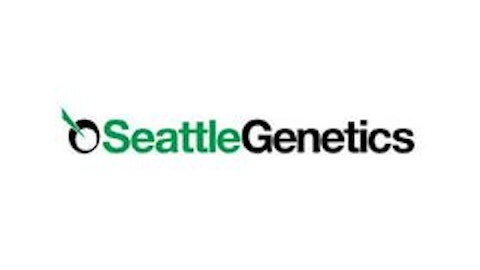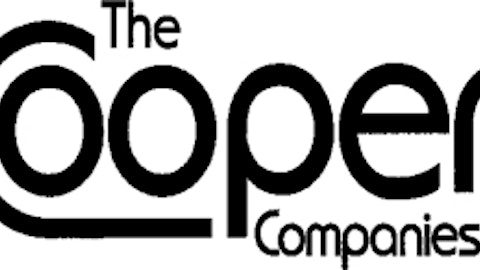Check that bottle of Motrin Infants formula before you give it to a baby.
Johnson & Johnson (NYSE:JNJ) recently announced a recall of around 200,000 bottles of Motrin Infants’ Drops Original Berry Flavor. The problem is that some of the medicine could contain tiny pieces of plastic. J&J said that three lots of the half-ounce bottles — with lot numbers DCB3T01, DDB4R01 and DDB4S01 — could potentially be affected.
Thankfully, no illnesses or injuries have been reported so far, according to the company. Could the recall ultimately hurt Johnson & Johnson (NYSE:JNJ), though?

Is a Band-Aid enough?
This latest incident appears to only be a minor scratch for Johnson & Johnson (NYSE:JNJ). While 200,000 bottles might seem like a big number, it’s not that large compared with past recalls. The company stated that the problem resulted from a manufacturing process at a third-party supplier.
Johnson & Johnson (NYSE:JNJ) moved quickly to issue the recall. The company asked retailers to remove the affected products from store shelves. Customers who already purchased bottles of medication from the affected lots can call for a refund.
Because of the relative small scale of the recall, no reported problems, and the company’s rapid response, there has been no discernible impact on J&J stock. However, yet another instance of quality issues could have some investors wondering if Johnson & Johnson (NYSE:JNJ) needs more than just a symbolic Band-Aid to fix its underlying problem.
Recurring theme
So far in 2013, J&J has already recalled 32 million oral contraceptives, 3.3 million bottles of Tylenol drops, nearly 2 million blood glucose meters, 1.7 million bottles of Children’s Tylenol, and 7,500 hip implants because of various quality issues. Since 2009, the company has conducted around 40 recalls.
The biggest of these occurred in 2010. J&J recalled more than 136 million over-the-counter medications including Tylenol, Motrin, and Zyrtec. This recall did take a toll on shares. It also resulted in the shutdown of J&J’s McNeil business unit’s primary manufacturing facility in Fort Washington, Penn.
After that big recall, Warren Buffett actually added to his position in J&J. However, following further woes — including more recalls and litigation — Buffett dumped most of his shares in the company. He commented in an interview that J&J had “obviously messed up in a lot of ways in the last few years.”
By comparison
Buffett sold a couple of billion dollars’ worth of J&J stock throughout 2012. He probably would have been better off holding on to them. J&J ended up more than 6% in 2012. Shares are up nearly 25% so far in 2013.
Despite the plethora of recalls, J&J handles them well. The company set the standard on how to deal with public relations issues related to product safety with the big Tylenol scare that occurred in 1982. Other companies appear to have learned from J&J along the way.
For example, Pfizer Inc. (NYSE:PFE) recalled around 1 million birth control pills in January and February 2012. Despite the negative publicity, the stock didn’t suffer appreciably. Of course, the birth control pills — Lo/Ovral-28 and generic norgestrel and ethinyl estradiol — weren’t huge revenue generators for Pfizer Inc. (NYSE:PFE). Sales figures weren’t high enough to even provide details on the company’s SEC filings, so a negligible stock impact was to be expected.
Likewise, Novartis AG (ADR) (NYSE:NVS) had a big recall of over-the-counter medications, including Excedrin and NoDoz, in January 2012. Shares fell slightly, but Novartis recovered easily. Novartis AG (ADR) (NYSE:NVS) took a one-time charge of $120 million related to the recall. However, as with Pfizer Inc. (NYSE:PFE), the financial hit wasn’t enough to make a significant dent in the stock’s performance.
Even when there aren’t major negative effects, it’s never good when a drugmaker has to recall its products. Doing so 40 times within a span of less than five years certainly isn’t a track record to brag about — no matter how well the recalls are handled.
However, there are no indications that the recalls from this year are affecting J&J’s stock performance. Investors probably don’t have any reason to be overly concerned. But if the trend continues, J&J shareholders might ask that the company apply less Band-Aids and simply be more careful.
The article Will a Band-Aid Be Enough for J&J’s Latest Recall? originally appeared on Fool.com and is written by Keith Speights.
Fool contributor Keith Speights has no position in any stocks mentioned. The Motley Fool recommends Johnson & Johnson. The Motley Fool owns shares of Johnson & Johnson.
Copyright © 1995 – 2013 The Motley Fool, LLC. All rights reserved. The Motley Fool has a disclosure policy.





